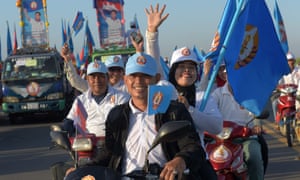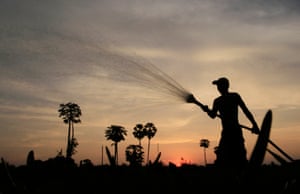 |
| The Cambodian People’s Party (CPP) has held power for 32 years. Here supporters ride their motorbikes on the last day of the commune election campaign. Photograph: Tang Chhin Sothy/AFP/Getty Images |
Cambodian elections: The women who lost their land and are now fighting for power
Women have long been at the forefront of protests against land grabbing in Cambodia. Now some are running for office in an attempt to bring about change
The Guardian | 3 June 2017
For as long as she has been able to vote, Sok Da has supported the Cambodian People’s party (CPP). But on Sunday, the 44-year-old will turn on the party that has ruled Cambodia for decades: not only is she supporting the opposition in local commune elections, she’s standing as a candidate.
For Da, it is the last resort in her long battle for justice after her family’s 8.5 hectares of farmland were seized and their home demolished in 2014. “I shouted that they should kill me if they want to clear my land,” she says, adding that she was detained for four nights by police after the incident. “Now I am living with my younger sister, because I do not have my own land any more,” she says. “I’m so heartbroken.”
Like many Cambodians, Da has been caught on the twin prongs of a patchy national land registry system (the Khmer Rouge abolished private property ownership and it has not really got back on its feet since) and a long-running government policy of granting large tracts of land to private firms to encourage development, which led to more than 2.1m hectares being handed out as economic land concessions (ELCs).
Da’s commune has been bound up in a government grant to the timber magnate Try Pheap; they accuse his company of forcibly evicting them to make way for his MDS Special Economic Zone. Da’s last hope is that ousting the incumbent CPP commune chief will help them all get back their land. (Try Pheap did not respond to requests for comment.)
Da is among a number of formidable women embroiled in the country’s land conflicts. One of the most prominent female land rights activists, Tep Vanny, was recently jailed for the third time over her long-running campaign against the forced eviction of her community from Phnom Penh’s Boeung Kak Lake area.
Women are significantly underrepresented in Cambodian politics, with currently less than 18% of commune council seats held by women. While the country has committed to achieving the UN’s sustainable development goal of equal representation by 2030, and both major political parties say they are working to increase the number of female candidates they field, men are proving resistant.
Meanwhile joining the opposition party poses a greater risk for women than those who sign up to the ruling party, says Thida Khus, executive director of women’s rights organisation Silaka, due to “intimidation, violence, [negative] implications for their businesses. It’s very real for the opposition parties”.
And this election is unlikely to bring about significant change to female representation, with women making up just 27% of candidates running in the 1,646 communes nationwide. Overall, less than 8% of female candidates have been selected for the top spot on the ballot – meaning few are on track to become commune chiefs.
But female activists like 27-year-old Khum Rany are undeterred. In late 2014, she was among a group of villagers in Cambodia’s Preah Vihear province who hijacked two bulldozers being used to clear their farmland for a sugar plantation, and took the drivers hostage overnight.
Now the top Cambodia National Rescue party (CNRP) candidate in Brame commune, Rany says she will continue fighting on behalf of about 300 families for the return of their land from Rui Feng (Cambodia) International, which reportedly holds government-issued economic land concessions in the province totalling 40,000 hectares. Rui Feng states that “our company only developed the economic land concession (including clearing and planting) granted by the royal government of Cambodia”.
Rany says her family lost six hectares of land to the firm and must now rely on their neighbours’ generosity. “We still have about another two hectares of land to farm rice, but it is not enough to feed us,” she says.
Research by the Cambodian Centre for Human Rights (CCHR) released last year found that Cambodian women “bear the brunt” of negative consequences from land disputes. “Particularly troubling [were] findings regarding increased domestic violence and the serious impacts on the mental health of women affected by land conflict,” says executive director Chak Sopheap.
Nget Chan Dara broke down and cried as she recounted her family’s story, one of 68 families who lost 98 hectares of land to a “powerful” businessman in the 1990s, who sold on the land in 2013. Their efforts to reclaim it – taking petitions to Prime Minister Hun Sen’s house, protesting outside the royal palace and lodging complaints with authorities – have been fruitless. Now she too is standing as a CNRP commune chief candidate in Kep province. “If I win the election, I will find justice for me and the other victims,” she says.
Whether or not that is possible remains to be seen. The CPP holds an overwhelming majority at the local level, and party spokesman Sok Eysan is confident the party will win on Sunday. “Among the 7.8 million people who are registered to vote in the election, 60% are [members of] the Cambodia People’s party,” he says.
While Eysan did not respond directly when asked if any of the CPP’s female candidates had been victims of land grabbing, he says the government is “working hard” to solve land disputes through the courts and by providing ownership documents to people who lack land titles.
However, CCHR’s Sopheap says that authorities, including commune officials, have at times tolerated and even actively colluded with companies that forcibly evict communities, while the judicial system and land dispute resolution mechanisms have repeatedly failed many Cambodians.
“That female victims of land grabbing are willing to defy these obstacles to stand as candidates is testament to their courage and commitment,” she says. “But also to their lack of any other choice.”



No comments:
Post a Comment